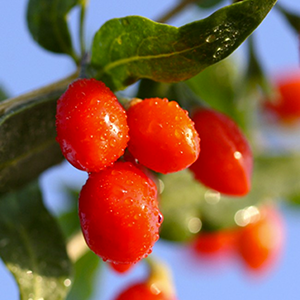El uso de las bayas de Goji se remonta a los inicios de la medicina china. Las bayas de Goji se consideran tanto una fruta como una hierba. Las bayas de Goji se han utilizado para tratar muchos problemas de salud comunes, como diabetes, fiebre, problemas oculares relacionados con la edad y presión arterial alta. Son una excelente fuente de antioxidantes, 18 aminoácidos (incluidos los 8 esenciales para la vida), vitaminas (C, B1, B2, B6 y E), betacaroteno (vitamina A, más que zanahorias), 22 oligoelementos, y lleno de fibra. Las bayas de Goji también son ricas en polisacáridos de Lycium barbarum (LBP), que exhiben actividades anticancerígenas, antioxidantes, hipoglucémicas e inmunológicas. En un estudio clínico de pacientes con cáncer avanzado, los investigadores concluyeron que el dolor lumbar se puede utilizar como adyuvante en la terapia del cáncer (1).
Las bayas de Goji tienen una capacidad de absorción de radicales de oxígeno (ORAC) 10 veces mayor que la de los arándanos. Los antioxidantes son clave para prevenir el daño celular causado por los radicales libres. La taurina, un compuesto de la baya de Goji, puede ayudar a proteger contra la pérdida de visión relacionada con la diabetes, y la zeaxantina puede proteger la retina al absorber la luz azul. Se ha demostrado que los polisacáridos ayudan a equilibrar el azúcar en sangre y la respuesta de la insulina, y la betaína para prevenir la enfermedad del hígado graso y el daño vascular (2). La baya de goji también parece ofrecer protección a la piel contra la radiación UV (4).
Se ha demostrado que el dolor lumbar inhibe ciertos cánceres de colon (3), tumores de sarcoma, cáncer de próstata y cáncer de mama (5). También alivió la disminución de glóbulos rojos y blancos en ciertos ratones mielosuprimidos inducidos por irradiación o quimioterapia (inyectados por vía subcutánea). El dolor lumbar contribuye al crecimiento de células madre y aumenta la cantidad de monocitos en la médula ósea. Goji Berry utilizado en varios ensayos clínicos recientes para el tratamiento de la médula ósea con un déficit de producción de glóbulos rojos, glóbulos blancos y plaquetas mostró que las bayas de Goji provocan una mejora notable en todos los parámetros de la sangre.
Las bayas de Goji podrían interactuar con anticoagulantes como warfarina, medicamentos para la diabetes y medicamentos para la presión arterial. Hable con su médico antes de tomar cualquier producto con bayas de Goji.
General:
WebMD. Goji Berries: Health Benefits and Side Effects. http://www.webmd.com/balance/goji-berries-health-benefits-and-side-effects
Diabetes:
2)The Organic Diabetic. Goji berry health benefits for diabetics. 2016. http://theorganicdiabetic.org/2016/01/goji-berry-health-benefits-for-diabetics/
Cancer:
1)Bodeker, G. "Integrative oncology meets immunotherapy: New prospects for combination therapy grounded in Eastern medical knowledge", Chinese Journal of Integrative Medicine,2012,18,(9),652—662. doi=10.1007/s11655-012-1201-0. https://www.researchgate.net/profile/Gerard_Bodeker/publication/230769077_Integrative_oncology_meets_immunotherapy_new_prospects_for_combination_therapy_grounded_in_Eastern_medical_knowledge/links/0046352a57bb6111cb000000.pdf
3)Sadia Afrin, Francesca Giampieri, Massimiliano Gasparrini, Tamara Y. Forbes-Hernandez, Alfonso Varela-López, José L. Quiles, Bruno Mezzetti and Maurizio Battino. Chemopreventive and therapeutic effects of edible berries: A focus on colon cancer prevention and treatment. Molecules 2016, 21(2), 169; doi:10.3390/molecules21020169. http://www.mdpi.com/1420-3049/21/2/169/htm
4)Reeve, V. E., M. Allanson, S. J. Arun, D. Domanski and N. Painter (2010) Mice drinking goji berry juice (Lycium barbarum) are protected from UV radiation-induced skin damage via antioxidant pathways. Photochem. Photobiol. Sci. 9, 601–607. http://pubs.rsc.org/en/content/articlelanding/2010/pp/b9pp00177h#!divCitation
5)Goji (Lycium barbarum and L. chinense): Phytochemistry, Pharmacology and Safety in the Perspective of Traditional Uses and Recent Popularity Olivier Potterat1 Planta Med 2010; 76(1): 7-19 DOI: 10.1055/s-0029-1186218 https://www.thieme-connect.com/products/ejournals/html/10.1055/s-0029-1186218
